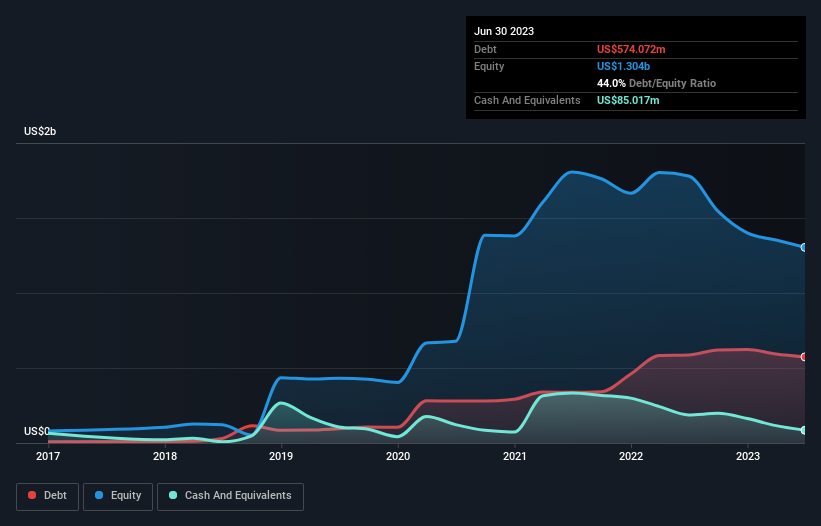Some say volatility, rather than debt, is the best way to think about risk as an investor, but Warren Buffett famously said that 'Volatility is far from synonymous with risk.' So it seems the smart money knows that debt - which is usually involved in bankruptcies - is a very important factor, when you assess how risky a company is. Importantly, Curaleaf Holdings, Inc. (CSE:CURA) does carry debt. But is this debt a concern to shareholders?
When Is Debt Dangerous?
Debt and other liabilities become risky for a business when it cannot easily fulfill those obligations, either with free cash flow or by raising capital at an attractive price. If things get really bad, the lenders can take control of the business. However, a more usual (but still expensive) situation is where a company must dilute shareholders at a cheap share price simply to get debt under control. By replacing dilution, though, debt can be an extremely good tool for businesses that need capital to invest in growth at high rates of return. The first thing to do when considering how much debt a business uses is to look at its cash and debt together.
View our latest analysis for Curaleaf Holdings
What Is Curaleaf Holdings's Net Debt?
As you can see below, Curaleaf Holdings had US$574.1m of debt, at June 2023, which is about the same as the year before. You can click the chart for greater detail. However, because it has a cash reserve of US$85.0m, its net debt is less, at about US$489.1m.

How Strong Is Curaleaf Holdings' Balance Sheet?
Zooming in on the latest balance sheet data, we can see that Curaleaf Holdings had liabilities of US$515.9m due within 12 months and liabilities of US$1.48b due beyond that. On the other hand, it had cash of US$85.0m and US$51.0m worth of receivables due within a year. So its liabilities total US$1.86b more than the combination of its cash and short-term receivables.
While this might seem like a lot, it is not so bad since Curaleaf Holdings has a market capitalization of US$3.18b, and so it could probably strengthen its balance sheet by raising capital if it needed to. However, it is still worthwhile taking a close look at its ability to pay off debt. When analysing debt levels, the balance sheet is the obvious place to start. But ultimately the future profitability of the business will decide if Curaleaf Holdings can strengthen its balance sheet over time. So if you want to see what the professionals think, you might find this free report on analyst profit forecasts to be interesting.
In the last year Curaleaf Holdings wasn't profitable at an EBIT level, but managed to grow its revenue by 11%, to US$1.4b. That rate of growth is a bit slow for our taste, but it takes all types to make a world.
Caveat Emptor
Over the last twelve months Curaleaf Holdings produced an earnings before interest and tax (EBIT) loss. To be specific the EBIT loss came in at US$64m. When we look at that and recall the liabilities on its balance sheet, relative to cash, it seems unwise to us for the company to have any debt. So we think its balance sheet is a little strained, though not beyond repair. However, it doesn't help that it burned through US$27m of cash over the last year. So to be blunt we think it is risky. The balance sheet is clearly the area to focus on when you are analysing debt. But ultimately, every company can contain risks that exist outside of the balance sheet. For example - Curaleaf Holdings has 1 warning sign we think you should be aware of.
If you're interested in investing in businesses that can grow profits without the burden of debt, then check out this free list of growing businesses that have net cash on the balance sheet.
New: AI Stock Screener & Alerts
Our new AI Stock Screener scans the market every day to uncover opportunities.
• Dividend Powerhouses (3%+ Yield)
• Undervalued Small Caps with Insider Buying
• High growth Tech and AI Companies
Or build your own from over 50 metrics.
Have feedback on this article? Concerned about the content? Get in touch with us directly. Alternatively, email editorial-team (at) simplywallst.com.
This article by Simply Wall St is general in nature. We provide commentary based on historical data and analyst forecasts only using an unbiased methodology and our articles are not intended to be financial advice. It does not constitute a recommendation to buy or sell any stock, and does not take account of your objectives, or your financial situation. We aim to bring you long-term focused analysis driven by fundamental data. Note that our analysis may not factor in the latest price-sensitive company announcements or qualitative material. Simply Wall St has no position in any stocks mentioned.
About TSX:CURA
Curaleaf Holdings
Produces and distributes cannabis products in the United States and internationally.
Undervalued with reasonable growth potential.
Similar Companies
Market Insights
Community Narratives



